November 22, 2022
As his time on the GPC’s Board of Directors comes to an end, Peter Wilson of Wilson International Trade speaks to Jose Martins about the upcoming harvest and what he’s learned from 30 years in the industry.


I started as a grain trader with the Australian Wheat Board, which is obviously a very old name in the global grain business and principally statutory marketing organization for Australian wheat. And that organization started trading pulses, and then oil seeds, and so I pretty well started their pulse trade back in the very early 90s.
Those were very early days in the international pulse trade in Australia. We were largely producing desi chickpeas, and fava beans, and I was also doing some field peas and lupins but they were all going as stock feed into Europe, particularly Spain.
I think we've seen the global pulses industry really mature into a professional business. And there's been some real unanimity: unanimity around key issues that impact trade.
In my time, we've moved to have a GPC pulses contract, which enables parties to trade with greater confidence, understanding that there are solid guidelines and agreements sitting underneath the trade that we’re all participating in.
There are issues that come up from time to time with certain trading countries and their application of things like MRLs, such as rare pesticide usage, the recording of uses, and the capacity to test. When this occurs, GPC swings into action to discuss and clarify issues with importing and exporting countries, and working with organisations such as the Codex Committee in terms of making sure that we get sensible application of science-based risk assessment to ensure that we keep trade clean.
In addition to all of this, as a result of Covid, we had to pivot to have a global, digital presence as well as a physical presence. We had to become a very virtual organization for a couple of years, and now our major revenue stream are actually conferences.
I take my hat off to the management team at GPC, including the Presidents and the Leadership Group, who were able to pivot so quickly to meet the needs of its members whilst also staying financially fluid.
In terms of the usage of fungicides, pesticides, and the whole suite of chemistry that farmers use in their everyday production, there are probably two main issues.
Firstly, there is little incentive for farmers to overuse a chemical compound, because they are aware that testing is carried out in the sector, and they don't want to be found to be in breach of an MRL.
Secondly, they pursue great discipline in terms of the application of the chemicals to their land, because the labels on the fertilizing products clearly outlines the amounts that are needed. For example, it will say that you only needs a certain amount of chemical per 100 litres, or per hectare, and so there is no reason to use any more as you don't get any extra benefit from it.
In addition to the above, it’s very expensive. So, there's no incentive for someone to overuse a chemical compound at all.
And I think the other thing that we have spent a lot of time on the GPC is trying to keep that confidence with the consumer.
Part of the issue globally today, particularly in Western nations, is we have a fairly big gap between people. However, in the last couple of generations, pretty much everybody had a family member or close friends who lived and worked on a farm. And so, they would often visit farms, farms were smaller, and we had a lot more farmers in many countries, including Australia. And so, by the fact of numerical supremacy, you had more people who had an ‘association’ with someone who, who grew stuff.
As a result, they had an instant understanding of what to do if they had to control an insect, or other farming issues. There was some degree of chemistry applied to control that insect, but they'd been there and they'd seen that it was done professionally, and it's certainly not like the Wild West. And therefore, when people would sit down to eat that food, there was a confidence in the quality assurance around that food.
The risk we face now as we as we get further away from previous generation farming habits is the number of farmers that actively farm are noticeably declining. With modern technologies and demands, farmers tend to manage larger floor areas, and consequently have less of a connection between what's being produced on the farm and those who are consuming the product.
I think it's incumbent on organizations like GPC and global farming groups to make sure that connections between farmers and consumers are prioritized and stay transparent and strong, because we don't want a situation where people are banning certain chemical compounds that are actually beneficial so that we can use less diesel on that we could keep our quality of our product really high.
This is a time of the year when crops are maturing in northern Australia. Usually, in late October, in northern Queensland, we should be already in the field harvesting things like chickpeas, whilst in southern Queensland, we certainly should be harvesting things like fava beans.
However, over the past month or so, it has been tremendously wet in Australia. We are in the middle of ‘La Niña’. This year, we are getting a lot of extra water, so in places like Central Queensland, where they are currently harvesting, they’ve had anywhere from 8 to 12 inches of rain across a lot of that area, which runs the risk of downgrading crops, as well as crops standing in water, which isn't particularly useful because the crop can fall over. And farmers have to get a combine harvester through those paddocks, as they’re not hand harvested.
In summary, there's been a lot of rain in central Queensland in particular, there’s been a lot of flooding in northern New South Wales and parts of southern Queensland. And through New South Wales and Victoria, we've also had quite a lot of rain.
Rain on crops that are still in the vegetative state and before they move to grain fill are vulnerable to disease under these sort of wet conditions. With high humidity and other high moisture situations, we can get root base diseases, as well as leaf and folia type diseases, that we then have to control with fungicides.
As such, we are going to have some challenges during this harvest season. We’re going to have a wet harvest, we are going to have some quality issues, and we may well lose some area due to flooding. It’s still a little bit early to report with certainty, but in the next two to four weeks, we'll get a really good idea of just what that tapestry will look like. This is going to be really a rich tapestry of outcomes, I think.
We are deeply saddened by the ongoing conflict between Russia and the Ukraine. And although we are a long way removed from the physicality of that horrendous conflict, we do notice that it is having a tremendous impact on supply chains and particularly in the cost of nitrogenous fertilizer.
For example, we are seeing that fertilizers like Urea 46N are probably three times the price they were about 15 months ago.
We are aware that some European fertilizer producers diverted a lot more of their gas to local usage, such as heating. And therefore, they reduced the amount of gas that went into Urea production, or nitrogen fertilizer manufacturing. That is very much a direct consequence of the conflict.
Then there is the increase in fuel prices. We have relatively strong oil prices compared to where they were during Covid, when we saw them really drop as the demand for oil basically collapsed in that period. And now we're seeing diesel at $2.35 a litre locally, which is incredibly expensive compared to how it was during Covid, when we saw fuel get down to 97 cents.
Because that supply chain did disrupt things, some of the chemicals we used to pay $140 for 20 litres for increased to $250 to $300 a drum. All of those inputs have been increasing in price in recent years, but there’s no doubt that the war has had a tremendous impact on our supply chains.
However, Australia is seen as a reliable supplier of product. And because people know that if they bring a vessel to Australia, it's going to get loaded whilst in the Black Sea today there is so much uncertainty, Australia's probably enjoying a little bit more demand than usual.
I think that the global trade remains incredibly important. Global trade continues to grow, but while a lot of things change, the way people like to do business remains the same. People still want to deal with people, they still want to deal with people they're comfortable with, they want to deal with people who can get the job done.
For people like myself, who've been working in the sector for almost 30 years, we've learned the tricks of the trade. You’re not dealing with someone who hasn't seen most of the things that can go wrong and right, in a relationship and in a trade. I would hope that people continue to see that the sort of value that they get from my experience, that can help their business gro
I have to make sure that I bring really reliable suppliers to the table because I don't want a problem with quality or supply. And equally, I've got to make sure I bring really reliable buyers to the supplier because equally, when you've got a shipping container sitting in a in a port somewhere, you need to make sure it's going to get lifted.
Sydney is Australia's world city - a beautiful city, with a majestic harbour, which we'll be making full use of during the convention. It'll be a great place for people to connect and to reconnect.
The weather is usually reasonably mild at that time of the year. And at that time of the year, equally, we'll have seen some seeding in southern Australia and in Northern Australia for the crops.
Conference attendees will get to see potential elevators, grain elevators, the people who are processing pulses domestically from that value added side, and they'll be able to meet and connect with all of their friends and colleagues from right around the world.
Pulse Australia is working very closely with GPC to make sure it is it is a great convention. In fact, the last time it was Down Under was in 2010. It's been a little while since we hosted it, and we are absolutely looking forward to it!

Peter Wilson / Wilson International Trade / Pulses 23 / desi chickpeas / fava beans / field peas / lupins / MRLs / Codex / Australia
Disclaimer: The opinions or views expressed in this publication are those of the authors or quoted persons. They do not purport to reflect the opinions or views of the Global Pulse Confederation or its members.